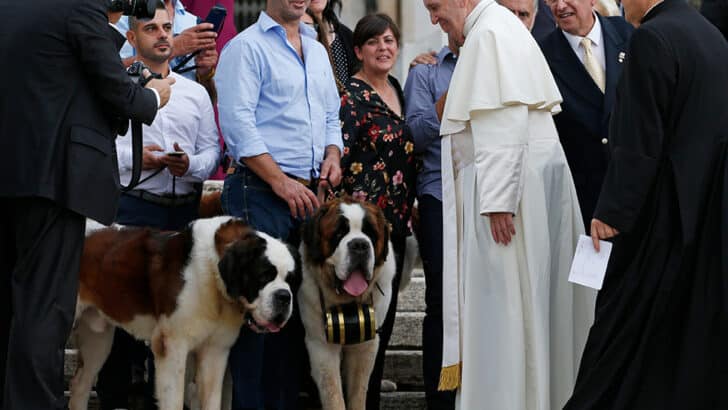One of Pope Francis’s critiques of modern society was that too many people prefer to have animal pets rather than children. In 2014, he described this trend as “selfish”, and returned to the theme in 2022, when he called it “a denial of fatherhood and motherhood” that “takes away our humanity”.
Well, the pattern has continued. Reports say that among ‘Generation Z’ – those currently aged between 12 and 28 – a significant number would prefer to have pets than children. One American study claims that 67% of the rising generation prioritise Fido or Felix over a baby. Another report even claims that 43% of Britons prefer their pets to their own children.
Reasons
The reasons given are obvious: pets are less trouble, more flexible, more biddable, love unconditionally (don’t answer back) and cost less. (Although with the rising costs of vets’ fees this may change. Kids do eventually earn their own living – the mutt doesn’t.)
As a cat-lover myself, I don’t see why people can’t feel both affection for their animals, and love for their children.
But it does seem that the favouring of pets may be part of the growing issue of low fertility, and the decline in births linked to the increase in animal companions. There’s a huge beauty-grooming industry around domestic pets, and dogs even have their own canine psychologists who can diagnose doggy depression. Owners sometimes see themselves as dog-mothers and fathers.
Not only may dogs and cats (and other pets) be child substitutes: but they have learned how to mimic young humans, crying like babies and snuggling up like affectionate toddlers. The proliferation of videos on social media also illuminates how cute and devoted pets can be.
I thought Pope Francis a little sharp in his scolding words about pet-lovers. But perhaps his view was prophetic about furry friends replacing children.
Coupledom
Births are also declining because coupledom itself is decreasing: statistical data in five global areas, including the West, show that ever more people are remaining single. The decline of marriage rates in Ireland – down 7.7% since 2014 – reflects this graph. And singletons often like to acquire an animal companion.
Marriage down: babies down: pets on the up is the evident pattern.
Remembering peasants
My current reading includes a fascinating book by Patrick Joyce, called Remembering Peasants – A Personal History of a Vanished World. It draws on his own family history in “Joyce country”, Co Mayo, and on peasant life in Poland, the Czech lands, southern Italy and elsewhere. This is a world just within living memory – rich in folklore, ritual, tradition, and faith.
“There are three features of Catholicism that are characteristic of Catholicism pretty much everywhere: cults, pilgrimages and the power of the image,” he writes. He underlines the especial value, to him, of Croagh Patrick, in his native Mayo. Nature, work and religion have been intertwined among peasants for thousands of years: Millet’s renowned painting “The Gleaners” captures this.
Patrick Joyce writes movingly of his mother’s prayer-book, the Treasury of the Sacred Heart, so well-used its cover has become frail. “The missal is a devotional tool, a tabernacle and a shrine, all in one….a library, too, an archive, for in it treasured prayer cards and newspaper cuttings are stored.” So many of us know such a missel.
Peasants are disappearing from the European landscape, and it’s a service to history to capture their lives (the paperback book has excellent pictures). And Mr Joyce has also, to some extent, rescued the word “peasant”, so often spoken disparagingly.
In France, it is still used perfectly respectfully: “paysan” simply being a country person, or farmer. The word remains, but will the people of the land survive an urbanised future?
I’ve been seeking a copy of my birth certificate for bureaucratic reasons and was rather surprised to be informed by a young civil servant at the HSE that it doesn’t seem to exist. She can find no record of me being registered at birth in Dublin in 1944, although I’ve supplied all the details pertaining – family names, dates, hospital location.
As I possess all the usual identification paraphernalia – passport, driving licence, marriage lines – I feel sure I must have had a paper birth cert at some point, but I can’t prove what I don’t have. And if the State says I don’t exist in their records, where will that leave my identity? It’s an unsettling experience, and gives one a glimpse into the Kafkaesque world of people who have no “documentation”, or are stateless. One feels adrift.
“I think, therefore I am,” said Descartes. But now it’s more “I am officially documented, therefore I am.”
Consolingly, there will be a baptismal certificate, as the Church always assiduously kept these records. So, even if my existence is not officially logged by the State, I exist as a baptised Christian!


 Mary Kenny
Mary Kenny